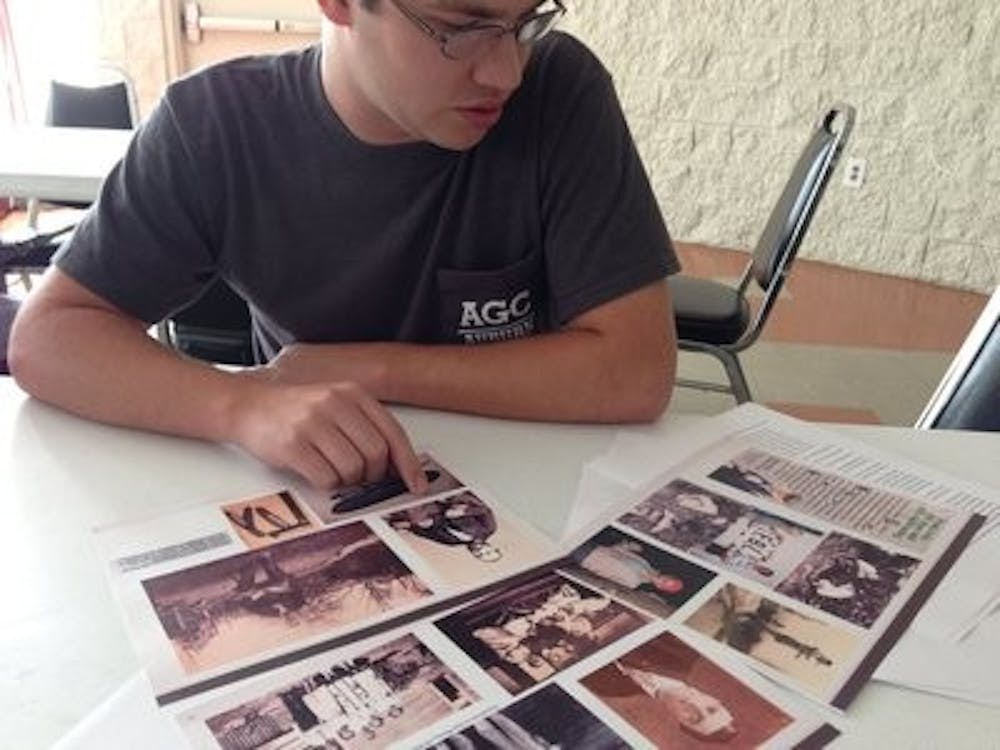Some people spend their entire lives avoiding the past, but one college student journeys to uncover his past.
This young genealogist celebrates family-history month every month, not just in October when it's the theme.
Daniel Whitten, senior in building science, researches history.
He is not interested in world history, but his family's history.
"It's important to know where you came from," Whitten said. "People don't think about it. Does anyone think about what did my great-great-grandfather do for a living? Or where did they come from? Did they come from England; did they come from Ireland, Africa? To me it fills a void."
Whitten said he began his family history quest two years ago with a wooden chest.
"I knew my grandparents had an old wooden chest that supposedly was brought over from England when one side of my family came (to the U.S.)," Whitten said. "It was full of old pictures and some of them did not have names and some of them did."
Whitten said he used Ancestry.com for the majority of his research. He also watches TLC's "Who Do You Think You Are?" and PBS' "Genealogy."
"I decided to document everything we had in that chest," Whitten said. "Scan all the pictures so each family member could have a copy because I did not want them to go to one family and no one else see them."
Whitten said he plans to compile his research into a book one day.
"I had some mystery pictures and I really wanted to find out who they were and also go further back in the family tree," Whitten said. "I spend a lot of my time pouring through census records, looking through old biographies other people have written before me. I just want to preserve my family's past and make sure we do not lose any more."
Whitten took a DNA test to find out his family heritage.
He is 67 percent British Isles, 20 percent Scandinavian and 13 percent Southern European.
"I got into it too late because by the time I really got into it, I had already lost two grandparents and right after I got interested in it, I lost my dad's mom," Whitten said. "So I lost three grandparents and pretty much did not get to talk to them about genealogy, and if I had, I would have a lot more information than I do now."
Whitten said he is trying to convince his 103-year-old great aunt to take the DNA test because he wants to debunk a family myth.
He feels she is the key to unlocking the mystery if his family is related to royalty.
"If I was to give someone advice on getting started, it would be talk to people," Whitten said. "Write down their stories, record them and make sure they are not forgotten. That's part of my goal, to regain some of the stories we have lost."
Whitten encourages people to document family history while they still can, while they still have great-great-aunts or great-aunts or grandparents who can tell their stories.
"I never will stop," Whitten said. "When I retire, many years from now, I am going to want to go on trips. And the trips are going to be somewhat dictated by where my family lived."
Whitten said genealogy is addicting and he has connected with distant relatives through his research.
"One great thing about all of this is, I have contacted, and run across, a lot of family members," Whitten said.
"Distant family members, like fourth cousins twice removed or something -- some crazy relation. But you know, we are related. We have a common grandparent if you go back far enough," Whitten said. "Say I have a picture of their great-grand parent that they have never seen before, and I am more than willing to share that with them," Whitten said.
"And if it was me, if someone shared that picture with me, it would make my day -- really just make my week. I like to do that for others too, because it is important to share information."
Whitten said his grandparents told him stories and he wishes he had listened harder, because he does not remember the tales.
He wants to get the stories back, so he studies genealogy.
"If I really wanted to go back and talk to an ancestor from like the 1700s," Whitten said. "I would just want to go to their house and hang out with them, you know?"
Do you like this story? The Plainsman doesn't accept money from tuition or student fees, and we don't charge a subscription fee. But you can donate to support The Plainsman.





